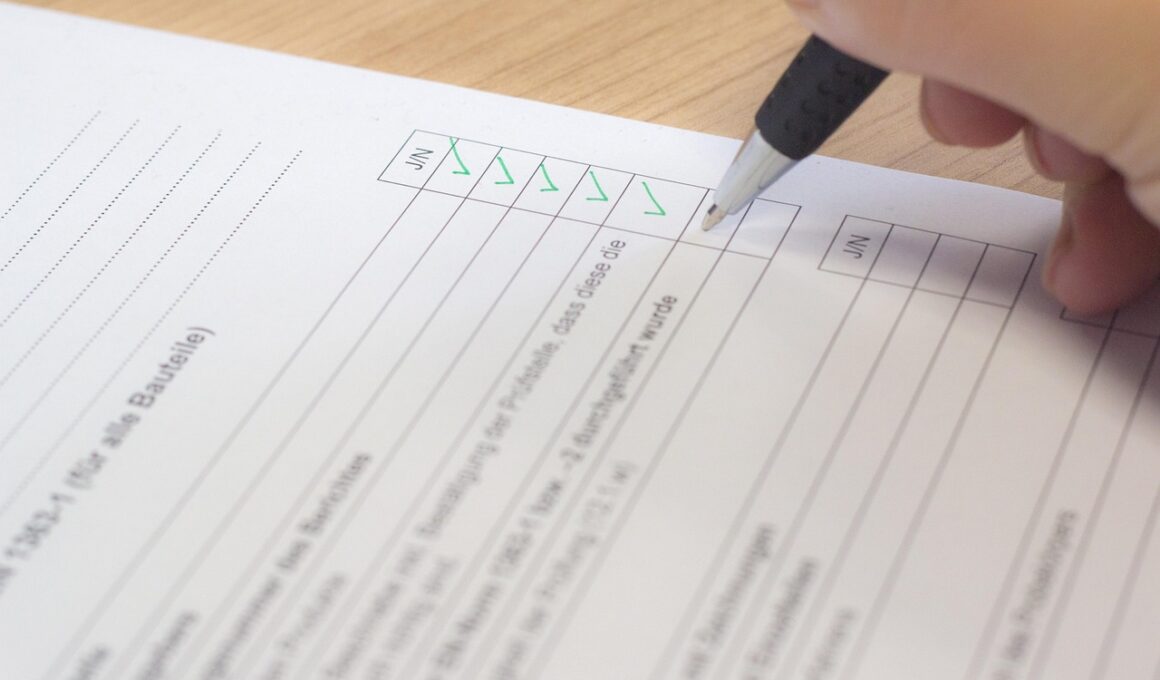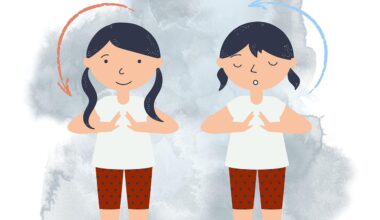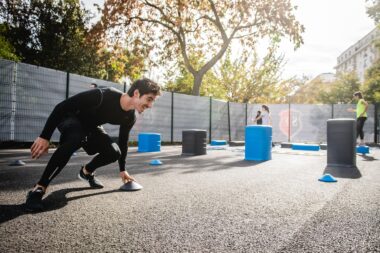CrossFit Scaling for Mental Health and Wellness
CrossFit is not just a physical training program; it also offers profound mental health benefits. Stress and anxiety can significantly impact one’s quality of life, making it vital to incorporate strategies that promote wellness. CrossFit scaling options provide individuals with the opportunity to modify workouts, ensuring both physical and mental comfort during exercise. Whether it’s due to injuries or varying fitness levels, participants can modify their routines without losing effectiveness. This adaptability fosters a supportive environment where everyone can progress, mentally and physically. Emerging research suggests exercise positively influences mood, and the community aspect of CrossFit contributes to this enhancement. Engaging in group workouts can create a sense of belonging, reducing feelings of isolation. Furthermore, scaling ensures participants can fully engage in a session without the dread of injury, which can be mentally hindering. Adjusted workouts not only build confidence as participants see improvements but also provide a holistic approach to health. Mental wellness is as key as physical prowess in CrossFit and finding one’s rhythm is essential for overall collective growth.
The Importance of Mental Health in CrossFit
Understanding the relationship between physical fitness and mental health is crucial for any athlete in CrossFit. The high-intensity workouts, while physically demanding, can simultaneously alleviate stress and promote healthy self-esteem. Regular participation in CrossFit can lead to improved mood and reduced symptoms of anxiety and depression. The community aspect of CrossFit supports mental wellness through camaraderie and mutual encouragement. By utilizing CrossFit scaling options, individuals with different backgrounds can effectively participate and see tangible personal growth. This focus on personal achievement, regardless of fitness level, empowers individuals. With customized modifications, athletes can connect their physical efforts to mental benefits. Importantly, acknowledging one’s limitations and utilizing scaling effectively fosters a growth mindset. This kind of growth is essential in navigating the mental aspects of any training program. Furthermore, understanding that not everyone experiences CrossFit in the same way can greatly enhance empathy within the community. Sharing personal struggles and victories can break down barriers and help build relationships while maintaining a supportive atmosphere. As participants grow mentally, so too does their resilience both in and out of the gym.
Another advantage of CrossFit scaling options is the promotion of inclusivity among participants. Scaling workouts ensure that individuals with varying physical abilities can join the same session. This inclusivity is not merely about fitness; it fosters an understanding of diverse backgrounds, abilities, and experiences. When physically challenged, athletes can adapt their exercises, allowing everyone to feel a sense of contribution. Group classes help develop lasting friendships and constructive dialogue. Emotional support is crucial when dealing with mental health issues. As individuals progress at different rates, sharing experiences can bolster community ties, providing a network of encouragement. The diversity of experiences in a CrossFit gym serves not only to enhance physical fitness but also to promote emotional bonds among participants. Being surrounded by like-minded individuals can motivate everyone, leading to improved performance both personally and collectively. As one transitions in their CrossFit journey, the importance of these social interactions cannot be overstated. Improved mental health often stems from camaraderie, compassion, and understanding within the gym environment. Thus, encouraging inclusive practices through scaling options creates a unique platform for holistic growth.
Creating a Personalized Workouts Experience
In CrossFit, personalizing workouts through scaling ensures a rewarding experience tailored for individual needs. Each person’s wellness journey is unique; thus, adaptations are integral for sustained motivation and progress. With every workout designed to push physical limits, it is equally essential to consider mental readiness while engaging in exercises. Using scales to adjust movements allows for controlled progression that builds confidence without overwhelming participants. Safe practice translates to greater enjoyment of the workouts. Individuals can choose appropriate modifications, refining their strength at a comfortable pace. This personalization nurtures a proactive attitude towards fitness. Furthermore, setting manageable goals aligns the physical exertion with mental aspirations. This synergy fosters an optimistic outlook; participants are encouraged to celebrate all achievements, no matter how small. Consistent engagement in achievable challenges enhances feelings of competence and self-worth. Cultivating a positive mental state is critical, as it significantly impacts overall wellness. Extending this customization beyond physical adjustments can involve altering workout schedules to suit personal routines. Balancing life demands with fitness goals reflects an understanding that wellness transcends mere physical ability.
Moreover, integrating mindfulness practices alongside CrossFit scaling enriches the experience tremendously. Mental health can greatly benefit from adding elements like breathing techniques, meditation, or focused attention during workouts. These mindfulness strategies help individuals cultivate a deeper connection to their movements, improving overall workout quality. By being present and aware, participants can reduce anxiety, recognizing when to pause, adapt, or push through challenges. Pairing physical challenges with mental exercises creates a dynamic training environment, allowing people to learn more about themselves. Flexibility in workouts can harmonize body and mind, creating pathways for deeper emotional understanding. Ultimately, these practices bring awareness to personal limitations and strengths alike. For individuals dealing with mental health challenges, this dual focus on mind and body offers vast potential. Holistically approaching fitness fosters long-term growth and resilience. As people become more attuned to their mental state, they can navigate life outside the gym more effectively. The connection between physical activity and process of self-discovery is where the real power lies. Establishing that link offers lasting fulfilment beyond the workout.
Setting Realistic Expectations and Goals
Setting realistic goals plays an essential role in maintaining mental health when participating in CrossFit. When individuals aim for achievable milestones, they enhance their motivation while minimizing frustration. The key lies in understanding personal capabilities and advocating for one’s mental well-being through CrossFit scaling options. Each participant’s journey is unique, and progress should be celebrated at every stage. This mindset discourages unhealthy comparisons with others, which can detract from individual growth. Focusing on personal development enables a clearer understanding of what success truly means, paving the way for intrinsic motivation. Athletes will find that smaller, incremental goals are often easier to achieve than aiming for larger, daunting targets. As individuals chip away at these manageable objectives, they sharpen their focus on positive reinforcement rather than negative thoughts. This transformation leads to increased satisfaction and encourages consistency in workouts. By fostering an environment that highlights collective success over individual competition, CrossFit nurturing designs an atmosphere that uplifts mental health. Recognizing personal achievements—whether scales or milestones—contributes to building a strong foundation for lasting resilience.
Finally, prioritizing self-care while participating in CrossFit is vital for sustaining both mental and physical well-being. It’s essential to allow for recovery, reflection, and rest as part of the journey. Individuals pushing themselves beyond capacity can encounter mental fatigue, discouraging feelings, and burnout. Incorporating scaling techniques prevents this by promoting workouts that encourage appropriate exertion. Rest periods should be seen as opportunities for healing rather than setbacks in progress. This encourages participants to engage in longer-term health and wellness journeys. Moreover, those exploring CrossFit for mental benefits should also embrace diverse recovery techniques. Complementing workouts with activities such as yoga, stretching, or recreational hobbies can provide necessary breathing space for the body and mind. By treating both physical and mental needs seriously, participants can develop a healthier relationship with exercise overall. The rewards gained from CrossFit extend beyond physical transformations; mental clarity and emotional balance follow suit. Therefore, establishing regular self-care routines is a valuable practice. Balancing fitness pursuits with recovery doesn’t only contribute to enhanced performance but creates a sustainable lifestyle rooted in wellness.
In summary, CrossFit scaling options significantly impact mental health and wellness. By adapting workouts to fit individuals’ needs and abilities, a more inclusive and supportive environment is cultivated. This adaptability not only fosters physical growth but also profoundly enhances the emotional experience. Individuals with varying capabilities can feel empowered, connecting their physical efforts with improved mental well-being. A sense of belonging forms through shared goals and accomplishments. Choosing to scale workouts enables participants to approach their fitness journey positively, reinforcing mental confidence. Each workout can become a celebration of progressive achievements while minimizing risks of injury. CrossFit provides a unique community bond that further extends the benefits of its training program. By integrating mindfulness and self-care strategies, participants nurture both body and mind effectively. Setting realistic expectations encourages a focus on personal journey satisfaction, thereby promoting mental resilience. The path to mental wellness is multifaceted, including the essential role of physical activity tailored through scaling. For those seeking to enhance their health, CrossFit can be a powerful tool, combining the strength of physical challenges with the support of community connection.








